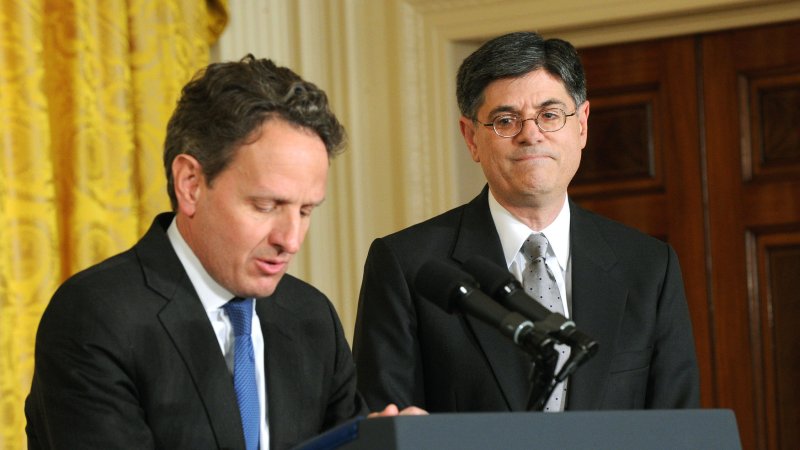WASHINGTON, Jan. 15 (UPI) -- U.S. Treasury Secretary Timothy Geithner warned Congress Tuesday workarounds allowing the government to pay its bills are not sustainable for much longer.
In a letter to legislative leaders, Geithner said the extraordinary measures he has been employing since the U.S. debt hit its limit of $16.4 trillion Dec. 31 will run out between mid-February and early March.
"For this reason, Congress should act as early as possible to extend normal borrowing authority in order to avoid the risk of default and any interruption in payments," Geithner urged. "If the extraordinary measures were allowed to expire without an increase in borrowing authority, Treasury would be left to fund the government solely with the cash we have on hand on any given day. As you know, cash would not be adequate to meet existing obligations for any meaningful length of time because the government is currently operating at a deficit."
Geithner noted the government makes about 80 million payments a month, including Social Security, disability, Medicare and Medicaid, veterans benefits and payments to defense contractors.
"If Congress does not act to extend borrowing authority, all of these payments would be at risk," Geithner warned. "This would impose severe economic hardship on millions of individuals and businesses across the country."
Geithner noted no Congress has ever failed to meet its responsibility of "protecting the full faith and credit of the United States. ... It must be understood that the nation's creditworthiness is not a bargaining chip or a hostage that can be taken to advance any political agenda."
He likened undermining the nation's creditworthiness to undermining the rule of law.
The letter came as Fitch Ratings said it would lower the U.S. credit rating if Congress stalls on raising the debt ceiling as it did in August 2011 -- when Standard & Poor's and other ratings agencies downgraded the U.S. credit rating.
"In Fitch's opinion, the debt ceiling is an ineffective and potentially dangerous mechanism for enforcing fiscal discipline," the agency said in a statement. "Protracted debate prior to increasing the debt ceiling is not an exceptional event, but against the backdrop of unprecedentedly large peacetime budget deficits and outstanding debt, any delay in raising the limit would pose ever increasing risks to the ability of the federal government to honor its obligations in a timely fashion."
Fitch said the debt ceiling must be coupled with a "credible medium-term deficit reduction plan ... consistent with sustaining the economic recovery," Politico reported.
Federal Reserve Chairman Ben Bernanke Monday warned congressional Republicans against using debt default as leverage to get spending cuts.
"Raising the debt ceiling, which Congress has to do periodically, gives the government the ability to pay its existing bills -- it doesn't create new deficits, it doesn't create new spending," Bernanke said at the University of Michigan.
"Not raising the debt ceiling is sort of like a family, which is trying to improve its credit rating, saying, 'Oh, I know how we can save money -- we won't pay our credit card bills,'" he said.















